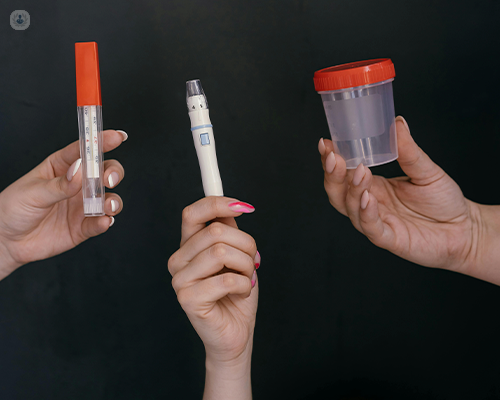Spotting the signs: when to worry about blood in your urine
Autore:
Haematuria, or the presence of blood in the urine, can be a concerning symptom for many individuals. It may appear visibly as red or pink urine, or it could be detectable only through medical testing. While haematuria can have benign causes, it can also signal more serious underlying conditions. Understanding when to seek medical advice is key to ensuring timely diagnosis and appropriate treatment. Mr Konstantinos Charitopoulos, revered consultant urological surgeon, tells us all about it.
This condition can be classified into two types:
- Gross haematuria: blood in the urine that is visible to the naked eye.
- Microscopic haematuria: blood in the urine that can only be detected under a microscope.
While haematuria can be alarming, recognising its causes and understanding when to seek medical advice is essential for proper management.

What are the common causes of blood in urine?
Several factors can lead to haematuria, including:
-
Urinary tract infections (UTIs): infections affecting the bladder, urethra, or kidneys may cause blood in the urine. Other symptoms often include pain during urination, frequent urges to urinate, and cloudy or foul-smelling urine.
-
Kidney stones: these are hard mineral and salt deposits that form in the kidneys. They can cause bleeding as they move through the urinary tract, often resulting in severe pain and discomfort.
-
Bladder or kidney cancer: although less common, blood in the urine can indicate cancer in the bladder or kidneys. This condition may be accompanied by symptoms such as pain, frequent urination, and weight loss.
-
Injury or trauma: any injury to the urinary tract or kidneys, whether from an accident or surgical procedure, can result in bleeding.
-
Enlarged prostate: in men, an enlarged prostate can lead to blood in the urine, particularly if it causes urinary obstruction.
-
Medication side effects: certain medications, especially blood thinners, can lead to haematuria as a side effect.
When should you be concerned?
While haematuria is not always a sign of a serious condition, it should not be ignored. Seek medical attention if:
-
The blood is visible: if you observe blood in your urine, consulting a healthcare professional is important.
-
Other symptoms are present: symptoms such as pain, fever, weight loss, or changes in urination patterns should be evaluated by a doctor.
-
There is a history of medical conditions: if you have a history of urinary tract issues, kidney disease, or cancer, report any new occurrences of haematuria.
Are you thinking about getting a diagnosis for haematuria? Arrange a consultation with Mr Konstantinos Charitopoulos via his Top Doctors profile.


